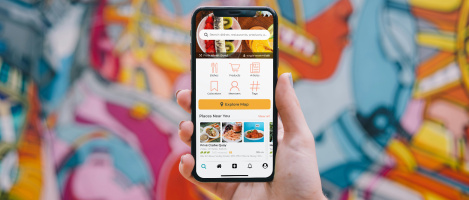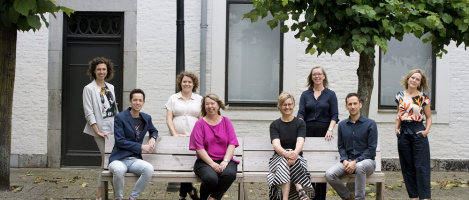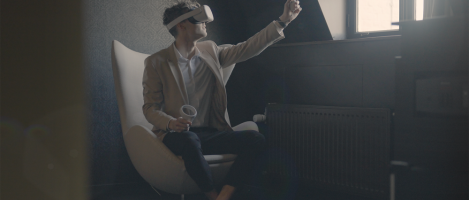Blog
Innovation runs through our veins at TU Dublin
Choosing for the Master Leading Hospitality Innovation means studying at three great and well-respected institutes, each with their own focus and expertise. In your second semester you'll study at TU Dublin. Here, innovation is the keyword and you will take centre stage in innovation processes within the global hospitality industry and work with upcoming trends and designs.

The future of global and strategic hospitality
Innovation is a critical driving force of success, but it can also turn into a trendy buzzword. You read about inventions and game-changing innovations, often from large media-savvy companies. This can lead us to thinking that innovation is always about science and technology and creating brand new products. Critical of course, particularly given the speed and challenges of the current environment, but innovation is more than that. It needs to be embedded in the culture, structure and leadership team.
We take this broad and connected approach, underpinned by design thinking, to create unique learning opportunities for you based on the understanding that this dynamic sector thrives on the ability to cater to evolving consumer and industry needs, providing exceptional experiences. From streamlined processes to groundbreaking technologies, innovation is necessary in every aspect of hospitality, from the guest journey to supplier relationships, to embracing mobile - all with a view to elevating service standards and setting industry benchmarks.
Take centre stage in innovation processes
Studying in Dublin for your second semester connects you to innovation in other ways. Dublin’s reputation as a global innovation hub and as a start-up ecosystem, along with TU Dublin’s focus on innovation, gives you access to cutting-edge and next-gen speakers and company visits.
You’ll be exposed to forms of technological and innovation, but you’ll also understand that these only work if the organization’s ‘behaviour’ is appropriate through a well embedded culture, and when the people element is managed effectively. Your modules will demonstrate that in hospitality, patterns of innovation vary widely. Prime examples, such as Marriott’s embedded culture of innovation and use of immersive environments, or Accor’s ‘augmented hospitality’ strategy set new standards in the industry. Innovative use of the IoT devices not only enhance comfort but also demonstrate a deep understanding of individual preferences. By leveraging data insights, these hospitality companies create tailored experiences that resonate with guests on a personal level, fostering loyalty and satisfaction.
Innovation in hospitality extends beyond just technological advancements. Airbnb revolutionized the travel and lodging landscape by capitalizing on the ‘sharing economy’. Their use of design thinking allows them to create an entire business model that responds quickly to and capitalizes on trends and creates authentic experiences, supported by continuous back-end process innovations.
Redefining hospitality
Small companies in the industry can and need to be innovative too. Despite their size, these businesses use creativity and ingenuity to carve out their niche to compete with industry giants. Innovation in smaller companies isn't just about flashy gadgets; it's about reimagining the guest experience. An example is CitizenM. Their use of modular construction allows for rapid and cost-effective expansion, enabling them to establish a global presence. Embracing technology integration to challenge industry norms also sets them apart, all based on a deep understanding of the needs of today’s mobile customer.
Sustainability is another area where innovation plays a crucial role in the hospitality sector. Supporting the UN Sustainable Development Goals, innovation is central to everything from concept development and design to operations, leveraging data analytics to minimize the environmental footprint. The Cliff House in Waterford, Ireland shows how sustainable innovation can be adopted by smaller properties too. Their eco-friendly dissolvable golf balls containing fish food hit the sustainable mark for clients teeing off onto their floating golf green in the Irish Sea. Innovations such as these keep an organization in tune and ahead of customer and environmental requirements, when of course partnered with a wider approach to always being better.
As you know, the hospitality industry reaches far beyond just hotels. This year, Barcelona F.C. will launch its Barca Hospitality Showroom, where hospitality, immersive experiences and commercial opportunities will merge. Building external networks with the likes of leading entertainment companies creates open innovation and shared knowledge.
From space tourism, the technological transformative power of booking engines, new and eclectic design forms of hotels and the power of cumulative customer-focused innovations, you’ll understand how to look for, create and lead innovation in a wide range of hospitality organizations.
Redefining hospitality is at the core of the Master of Science in Leading Hospitality Innovation.
 Hotel Management School Maastricht
Hotel Management School Maastricht Technological University Dublin
Technological University Dublin IQS Ramon Llull University
IQS Ramon Llull University

